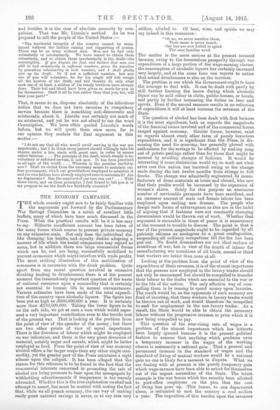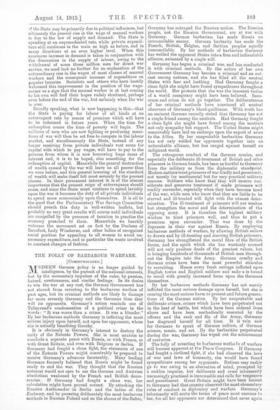THE ECONOMY CAMPAIGN. T HE whole country ought now to be
fairly familiar with the arguments put forward by the Parliamentary War Savings Committee in a series of excellent little leaflets, many of which have been much discussed in the Press. What the practical results will be it is less easy to say. Hitherto insufficient account has been taken of the many forces which concur to prevent private economy on any extensive scale. Not only does the individual dis- like changing his habits, and equally dislike adopting a manner of life which his social companions may regard as mean, but in addition there are large commercial forces which can be, and are being, successfully mobilized to prevent economies which might interfere with trade profits. The most striking illustration of this mobilization of commerce is in connexion with the drink problem. Quite apart from any moral question involved in excessive drinking leading to drunkenness, there is at the present moment the tremendously important question of the waste of national resources upon a commodity that is certainly not essential to human life in normal circumstances. Various estimates have been made of the total expendi- ture of the country upon alcoholic liquors. The figure has been put as high as £200,000,000 a year. It is certainly more than £150,000,000. Taking the lower figure to be on the safe side, we get at once a sum which would repre- sent a very important contribution even to the terrific cost of the present war. That is looking at the problem from the point of view of the spender of the money ; but there are two other points of view of equal importance. There is the diversion of labour which might be employed on war industries, and there is the very great diversion of material, notably sugar and cereals, which might be better employed as food. From the point of view of war economy alcohol offers a far larger scope than any other single com- modity, yet the greater part of the Press maintains a rigid silence upon the subject. It has been alleged that the reason for this reticence is to be found in the fact that the commercial interests concerned in promoting the sale of alcohol can bring pressure to bear upon the newspapers by withholding advertisements if temperance is too warmly advocated. Whether this is the true explanation we shall not attempt to assert, but must be content with noting the fact that, while we all preach economy, the one way of making really great national savings is never, or at any rate very seldom, alluded to. Of beer, wine, and spirits we may say indeed in this coimexion
"Oh no, We never mention them, Their name is never heard; Our lips are now forbid to speak The once familiar word.
The 'matter is the more serious at the present moment because, owing to the tremendous prosperity through war expenditure of a large portion of the wage-earning classes. the consumption of .alcoholic liquors has certainly increased very largely, and at the same time one regrets to notice that actual drunkenness is also on the increase.
The problem is one which the Government ought to have the' courage to deal with. It can be dealt with partly by still further limiting the hours during which alcoholic liquor can be sold either in clubs, public-houses, or hotels, and partly by further increasing the duties on beer and spirits. Even if the second measure results in no reduction of expenditure it will at least increase the revenues of the State.
The question of alcohol has been dealt with first because if is the most significant, both as regards the magnitude of the financial issues involved and of the commercial forces ranged against economy. Similar forces, however, exist as regards almost every other form of purely luxurious expenditure, and it is significant that the Press, in dis- cussing the need for economy, has generally glowed with enthusiasm for the savings to be effected by making soup out of potato peelings rather than for those that might be secured by avoiding changes of fashions. It would be interesting if some statistician would try to work out what extra cost this nation has incurred owing to the change made during the last twelve months from skimpy to full frocks. The change was admittedly engineered by manu- facturers of' dress materials at home and abroad, who saw that their profits would be increased by the expansion of women's skirts. Solely for this purpose an enormous number of serviceable garments have been sacrificed, and an immense amount of male and female labour has been employed upon making new dresses. The people who design such forms of extravagance as this are in the habit of arguing that if fashions were not constantly changing dressmakers would be thrown out of work. Whether that argument is excusable in times of peace it is unnecessary at the moment to trouble to discuss. The point is that a war of the present magnitude ought to be regarded by all patriotic citizens as analogous to a great conflagration, suspending all ordinary occupations till the fire has been put out. No doubt dressmakers are not ideal makers of munitions of war, but in view of the dearth of labour for manufacturing war munitions of all kinds, second or third best workers are better than none at all.
Looking at the problem from the point of view of the expenditure of State revenues, it is of the utmost importance that the persons now employed in the luxury trades should not only be encouraged but should be compelled to transfer their labour to the trades which'are essential to the war or to the life of the nation. The only effective way of com- pelling them is by ceasing to spend money upon luxuries. The result would be, as the opponents of such economy are fond of insisting, that these workers in luxury trades would be thrown out of work, and would therefore be compelled to seek for employment in the non-luxury trades. As a result, the State would be able to obtain the necessary labour without the progressive increase in price which it is now being compelled to pay. This question of the ever-rising rate of wages is a problem of the utmost importance which has hitherto been largely ignored because it is the present political fashion to assume that anything which produces even a temporary increase in the wages of the working classes is necessarily a national gain. That a general and permanent increase in the standard of wages and the standard of living of manual workers would be a national gain no one is likely for a moment to dispute. What we are dealing with at present is the purely temporary gain which wage-earners have been able to extort for themselves 'out of the urgent necessities of the State. The latest example is the war bonus which has recently been allotted to post-office employees on the plea that the cost of living ham gone up. This bonus, to one department alone, is estimated to cost the- country a cool million a year.. The imposition of this burden upon- the revenues of the State may be primarily due to political influences, but ultimately the general rise in the wage of manual workers is due to the law of supply and demand.- The State is spending at an unprecedented rate, while private expendi- ture still continued in the main as high as before, and in many directions at an even higher level. When this enormous increase in demand is taken in conjunction with the diminution in the supply of labour, owing to the withdrawal of some three million men for direct war service, we need look no further for an explanation of the extraordivary rise in the wages of most classes of manual workers and the consequent increase of expenditure on popular luxuries. Socialists and others who have hastily welcomed this improvement in the position of the wage- earner as a sign that the manual worker is at last coming to his own will find their hopes rudely shattered, perhaps oven before the end of the war, but certainly when the war is over.
Broadly speaking, what is now happening is this—that the State is paying for labour of all kinds at an extravagant rate by means of promises which will have to be redeemed in future years. When the time for redemption comes the time of poverty will begin. The millions of men who are now fighting or producing muni- tions of war will then be set free to compete in the labour market, and simultaneously the State, instead of any longer receiving from private individuals vast sums for capital with which to pay wages will have to pay to the persons from whom it is now borrowing huge sums of interest and, it is to be hoped, also something for the • redemption of capital. . Meanwhile the general destruction of wealth caused by the war will leave us all poorer than we were before, and this general lowering of the standard of wealth will make itself felt most severely by the poorest classes. In their permanent interest it is of the utmost importance that the present reign of extravagance should . cease, and since the State must Continue to spend lavishly upon the war it becomes the duty of all private individuals to spend more economically upon themselves. It is all to the good that the Parliamentary War Savings Committee should preach this duty in well-written leaflets, but probably no very great results will accrue until individuals are compelled by the pressure of taxation to practise the economy preached to them. Meanwhile we heartily welcome the movement set on foot by the Duchess of Beaufort, Lady Wimborne, and other ladies of recognized • social position for appealing to all .women to avoid un- necessary expenditure, and in particular the waste involved in constant changes of fashion.



































 Previous page
Previous page